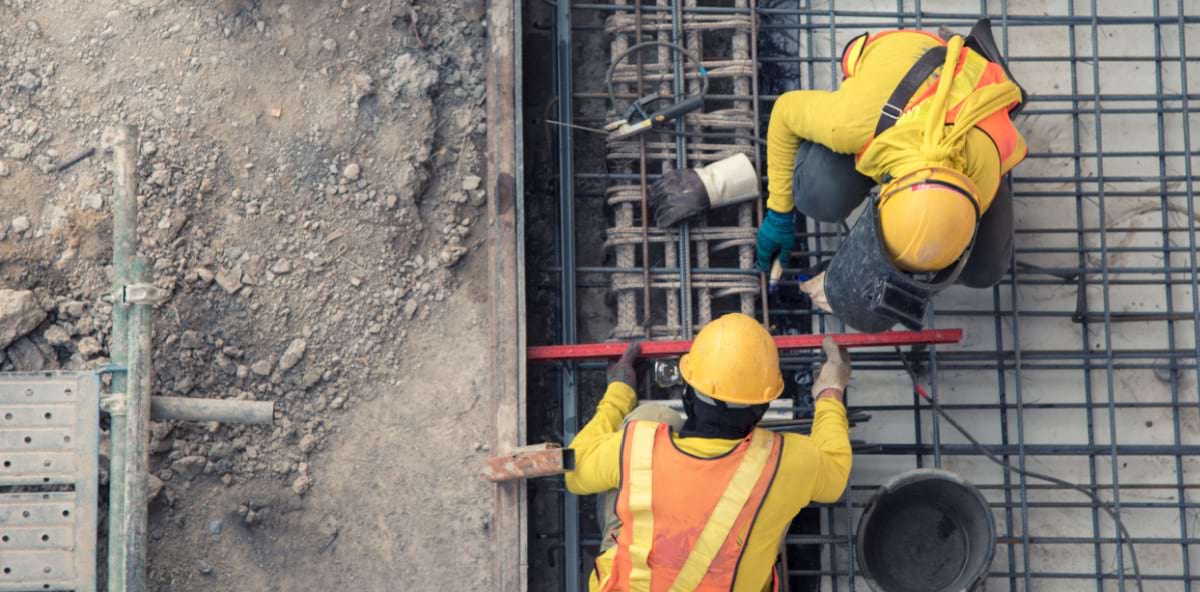How to get construction contracts: Winning bids and building success

Getting construction contracts for your business is as important as having the right tools for the job. An effective strategy for acquiring new business is the foundation upon which you can build your own path to success.
Let's take a look at how to launch a construction business, promote your company and find new opportunities to grow your business.
Craft a solid business plan for your construction company
Drafting a business plan is an important first step to starting a successful construction company. It’s the blueprint for how you’ll grow your business.
You might also need to show this plan to any potential lenders or investors, as they’ll want to see that you’ve put a lot of thought into launching and growing your business. Let's take a look at the key parts of a successful business plan:
An executive summary
You should start your executive summary with your business name. This should give people a clear indication of what your business does, while also setting yourself apart from your competitors. You can check the business names of successful contractors in your area, to get an idea of what’s been done.
You might also consider including the name of your town or region when you name your business, as this will make it easy for people to understand where you’re located. This could also help when people search Google for contractors in your area.
An effective logo
After choosing your name, you might consider a logo. You can buy a predesigned logo online, or hire someone to design one for you. An effective logo can also help you stand out from your competitors, especially if you use it on your business vehicle, business cards, and signs.
Get your contractor’s license
Each state has its own licensing requirements for general contractors. You’ll likely have to be 18 or older, prove that you have the required education and/or experience, and pass an exam. You might also have to carry certain types of general contractor insurance.
Register your business
You might also need to obtain a business license and register with your state or local government. Your state’s Secretary of State website and/or your local city or county clerk’s office, can help you figure out what’s required.
Some states require a license to work on any job that exceeds a given dollar amount in labor and materials, or to do any work involving things like plumbing, roofing, electrical, or HVAC work.
Analyze your market
What’s it like in your area for construction contractors? How many construction permits have been issued by the building and zoning authorities in your area, and for what kind of work? These are important things to consider.
You might also check with local construction trade groups and unions, to see what they think of the local marketplace, as well as your local chamber of commerce.
Many city and county governments have economic development authorities whose goal is to help their communities with economic growth. These could offer a wealth of information on the construction industry in your area.
If you plan on working for public institutions, such as local governments and schools, whatever construction work they’ve approved is public information. You should have no problem finding out the types of bids they’ve received and approved.
Choose your business structure and services
How will your business be structured? Will you be a self-employed business owner or a sole proprietor? Will you form a limited liability company (LLC)?
A sole proprietorship is the easiest and least expensive type of business to launch. Apart from a business license and contractor’s license (mentioned above), you’ll likely need a separate checking account for your business and can include your business income on your personal tax return.
LLCs require more paperwork and fees to set up. Their main advantage is they create a separate legal entity for your business, so your personal assets would be protected from your business debts and liabilities.
In addition, it’s important to have a clear idea of the type of work you can do, based on your contractor’s license and your abilities.
What kind of construction work will you pursue? Will you work in residential housing as a general contractor, or pursue larger projects such as commercial buildings? Do you have a particular expertise that sets you apart from other contractors in your area? Who are your target customers?
You should be able to cite specific services and have an idea of what you’ll charge for different kinds of work.

Get the right business insurance
As mentioned above, you’ll likely need certain policies for your business or contractor’s license, and to comply with the laws in your state. You’ll also need insurance to qualify for government contracts. Government agencies will require some types of insurance, and ask for proof of it, as part of the construction bidding process.
Even policies that aren’t required can be an important part of your risk management plan, as they can protect your business from a financial loss.
General liability insurance: Covers common third-party business risks like customer injury, customer property damage, advertising injury, and copyright infringement. It protects your small business from the high costs of lawsuits and helps you qualify for leases and contracts.
Business owner's policy: A BOP bundles general liability coverage and commercial property insurance at a discount. It protects against the most common third-party lawsuits and property damage.
Workers’ compensation insurance: Is required in most states for businesses with one or more employees. It’s also required for sole proprietors in riskier professions, such as roofing. It covers the medical costs and lost wages over work-related injuries and illnesses.
Commercial auto insurance: Required in most states for businesses that own vehicles, this policy covers your legal bills, medical expenses, and property damage if a business vehicle is involved in an accident.
Contractor’s tools and equipment insurance: This policy helps pay for repair or replacement of your tools and equipment in case they’re lost, stolen, or damaged. It typically applies to items that are less than five years old.
Professional liability insurance: Also known as errors and omissions insurance, these policies protect small businesses against the costs of client lawsuits over unsatisfactory work.
Builder's risk insurance: Sometimes called course of construction insurance, this policy protects structures under construction against damage from fire, theft, vandalism, and other risks.
Contractors pollution liability (CPL) insurance: CPL is a type of environmental insurance that covers pollution liability risks for contractors and their subcontractors, such as asbestos and chemical spills.
Surety bonds: Serve as a financial contract between a construction business or contractor, a client, and an insurance company. They guarantee the surety company will reimburse the client, up to the bond amount, if you fail to deliver on your contracted services.
Need a policy recommendation? Answer three questions and we can help you find the right coverage for your business.
Define your marketing and sales strategies
Your marketing strategy should start with a website. You might also consider a social media presence, although for this to be effective you’ll need to update your content on a regular basis.
A website makes it easy for potential customers to find your business. You don’t need to get too fancy, but it’s an effective way to let people know that you’re a legitimate business owner, what your qualifications are, and the type of work you do.
You could hire someone to set up a website for you, although web hosting services, such as GoDaddy, offer templates you can use to create a website yourself. Many web hosting services also have people you can hire to set up a website for you.
Your website should feature the name of your business, your location, and the type of work you do. You should also list your credentials, levels of experience, and licensing information.
Once you have your business established, you could ask your former customers for endorsements you could add to your website.
If your business involves commercial contracting work, such as building retail centers or office buildings, you might offer to include links to a customer’s website in exchange for an endorsement on your own website.
In addition to checking out the websites of your competitors, you should also look at their social media and online presence on platforms such as, Facebook, Angi (formerly Angie’s List), and Craigslist for ideas on how to promote your business. You could also create profiles and promote your business on LinkedIn, Nextdoor, and Instagram.
Make sure you’re listed in local business directories as well, such as Google Business Profile, Yelp, Yellow Pages, and your local Better Business Bureau.
In addition to highlighting endorsements on your website, you can ask your satisfied customers to post reviews on whatever internet or social media platforms they use. You can re-share this information as a way of promoting yourself and your customers.
It’s also a good idea to post signs at every job site that have your company’s name, logo, and website as a form of virtually free advertising.
Network within your community and your industry
Establishing and maintaining contacts within your local business community, and the construction industry itself, is important for growing your business and remaining profitable.
Your first step in successful networking should be to check with your local chamber of commerce. They may hold business meetups themselves, or be aware of those in your area.
Joining LinkedIn groups for your area and profession can be another way to establish contacts and discover new business opportunities. Some LinkedIn groups hold networking events where you can mingle and exchange business cards.
Joining professional organizations within the construction industry can give you access to a great deal of information. You can learn about new construction methods, the competitive bidding process, how to respond to a request for proposal, and best practices within the industry.
Here are the top professional organizations within the construction industry:
Associated Builders and Contractors is a national trade association within the construction industry. It has more than 22,000 members, who primarily work in the industrial and commercial sectors.
Associated General Contractors of America consists of construction contractors and related companies. Its goal is to provide education and research for its members, while advocating for the industry itself.
American Institute of Constructors offers certification programs, with the goal of raising the status of those in the construction industry.
American Subcontractors Association consists of subcontractors and suppliers within the building trades. It offers education and networking opportunities for professional growth.
Construction Management Association of America is dedicated to the interests of professional construction contractors and program management. Members consist of government and private sector owners, construction consultants, suppliers, academia, and legal organizations.
National Institute of Building Sciences supports the advancement of building science and technology while serving as an interface between government and the private sector.
Project Management Institute is a professional association for project management professionals. It provides advocacy, networking, research, and education services.
There are also many construction tradeshows and expos held throughout the year. Some focus on the construction industry overall, while others specialize in particular subjects and fields. Attending trade shows gives you the chance to learn about new products and techniques within the industry, and make connections with others in your industry.

Searching for contracts and submitting bids
Your procurement and solicitation process for new construction contracts depends on the type of work you intend to do.
It’s a good idea to connect with developers and realtors in your area, to gain their insights and possible job leads. Your local building and zoning officials might also provide information about the local marketplace.
If you intend to bid on government projects, you might also reach out to the contracting officer for state and federal agencies
Make sure you establish your credentials with every contact and make them aware of the scope of work you can perform, especially any developers or general contractors you meet. Let them know about your qualifications and the types of jobs you’d like to bid on.
You can also access online databases and services where you can find out about new projects, promote your business, and receive bids.
Online databases for contractors
I AM Builders bills itself as a national construction estimating firm that can help finding leads, through an online database of construction projects. It can also help in estimating construction project costs.
Building Connected is a commercial network for builders, general contractors, and subcontractors. Contractors can receive a free account that can lead to bid requests from developers and general contractors.
HomeAdvisor connects residential contractors and the homeowners who may want to hire them.
The Blue Book calls itself the largest and most active network in the commercial construction industry. It offers subscription services to a database that connects general contractors with those they may want to hire. Contractors, subcontractors, and other professionals offering services in the commercial construction industry can receive a free listing.
Dodge Construction Network maintains a database of construction jobs in government and the private sector.
ConstructConnect is a software provider for commercial construction firms. It also offers information on construction leads and project details, such as bidding lists, plans, and specifications. Customers can receive bids from general contractors based on their trade and location.
Federal contracting opportunities
If you intend to bid on federal government contracts, you’ll need to seek registration with the System for Award Management (SAM.gov). This is required for all government contractors.
It will ask for details on your credentials, certifications, and personal information, including your North American Industry Classification System (NAICS) codes, so you should have this information ready. Once you’re registered you can search for government construction contracts, and subcontracting opportunities.
The Small Business Administration (SBA) offers a contracting guide for those looking to do business with the U.S. government and how to win contracts.
The General Services Administration (GSA) also has information on how to sell to the federal government and government contracting.
You can search for subcontracting jobs through the SBA’s Subcontracting Network (SubNet). After you register with SubNet [Video], you can search for projects and bid on subcontracting jobs with general contractors working on federal construction projects.
How much do construction professionals make?
The average base salary for general contractors in the U.S. is $87,000, with a range of $49,000 to $156,000. Of course, your location can have a significant impact on income. New York City has the highest annual income for general contractors at more than $117,000, while the average pay in Houston is nearly $68,000.

Get insurance quotes for your construction company from Insureon
Complete Insureon’s easy online application today to compare insurance quotes from top-rated U.S. carriers. You can also consult with an insurance agent on your business insurance needs. Once you find the right policies for your small business, you can begin coverage and get your certificate of insurance (COI) in less than 24 hours.
Mike Mosser, Content Specialist
Mike spent several years as a reporter and editor covering politics, crime, and the world financial markets. He’s worked for several newspapers, a financial newswire, and a monthly magazine. As a copywriter, Mike has produced SEO-based content, marketing, public relations, and advertising work for a variety of companies.

















































